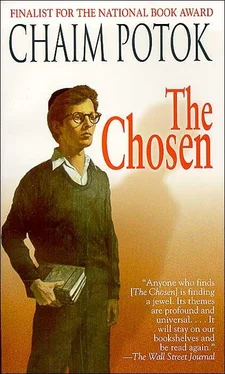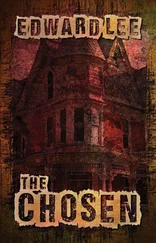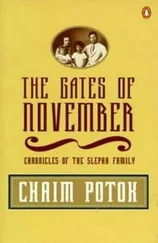I stared at him and felt a shock of coldness move inside me. 'You're studying German?'
He seemed surprised at my reaction. 'What's wrong with studying German? Freud wrote in German. What are you looking at me like that for?'
'Aren't his writings translated into English?'
'Not all of them. Besides, I want to read a lot of other things in German that haven't been translated yet. What's the matter with you? You've got the funniest look on your face.'
I didn't say anything.
'Just because Hitler speaks German doesn't mean that the language is corrupt. It's the most important scientific language in the world. What are you looking at me like that for?'
'I'm sorry,' I said. 'It just seems strange to me, your studying German.'
'What's so strange about it?'
'Nothing. How are you teaching yourself?'
'There's a grammar book in the reference library. I'm almost done memorizing it. It's an interesting language. Very technical and precise. It's amazing the way they put nouns together. Do you know what the word for" mysterious" is in German?'
'I don't know any German.'
'It's geheimnisvoll. It means "full of secret". That's what the subconscious is, geheimnisvoll. The word for "sympathetic" is teilnahmsvol – literally "full of part-taking". The word for charity is Niichstenliebe -literally, it means-'
'All right,' I said. 'I'm impressed.'
'It's quite a language. Yiddish is a lot like it. Yiddish was originally Middle German. When the German Jews came into Poland, they brought it with them.'
'You mean in the thirteenth century, when Poland encouraged the Jews to come in?'
'That's right. You know about that?'
'I didn't know about Yiddish being German.'
'My father doesn't, either. At least, I don't think he does. He thinks Yiddish is almost holy. But it's really from Middle German.'
I was going to ask him what the Middle meant in Middle German, but I decided not to push the conversation any further. I was upset enough as it was about his learning German. And it had nothing to do with Hitler, either. I kept remembering what my father had told me about Solomon Maimon. It all sounded so weird. I almost had the feeling I was talking to Maimon's ghost.
We talked some more about Graetz's version of Hasidism, and then somehow we got onto the subject of Danny's brother. He had been examined by a big doctor that morning, and the doctor had said he would be all right, but that he would have to be careful, no strenuous studying or exercising. He had gone with his father, and Danny said his father was now very upset. But at least his brother would be all right. It had something to do with his blood chemistry, Danny said, and the doctor had prescribed three different pills for him to take. He hadn't been very optimistic about the condition clearing up, either. He said he would have to take the pills as long as it persisted. 'It might persist his whole life,' Danny said sadly. Again, I got the impression that he loved his brother very much, and I wondered why he hadn't said a word to him during all the time I had seen them together yesterday in the synagogue.
Finally, we decided it was getting late, and we started down the wide marble staircase. When we were about halfway down the staircase to the second floor, Danny stopped and looked carefully around. He did the same when we were going down to the main floor. He replaced the Graetz book, and we went inside.
It was cloudy and seemed ready to rain, so we decided to take a trolley car back rather than walk. Danny got off at his block, and I rode the rest of the way alone, my head full of what we had talked about, especially his teaching himself German.
I told my father about it over the supper table.
'What does Danny want to read in German?' he asked me. 'He wants to read Freud.'
My father's eyes went wide behind their spectacles.
'He was very excited about it,' I said. 'He was talking about the unconscious and dreams. He was also reading Graetz on Hasidism: 'The unconscious and dreams,' my father muttered. 'And Freud. At the age of fifteen.' He shook his head gloomily. 'But it will not be possible to stop him.'
'Abba, was Graetz right in what he said about Hasidism?'
'Graetz was biased, and his sources were not acurate. If I remember correctly, he calls the Hasidim vulgar drunkards, and he calls the tzaddikim priests of Baal. There is enough to dislike about Hasidism without exaggerating its faults.'
I met Danny again in the library later that week, but he wasn't too enthusiastic when I told him what my father had said about Graetz. He told me he had read another book on Hasidism, and while the author hadn't accused the tzaddikim of encouraging drinking, he had accused them of almost everything else. I asked him how he was coming along with his German, and he said he had finished memorizing the grammar text and was reading a book he had borrowed from the German section of the library. He said he hoped to start reading Freud in a few weeks. I didn't tell him what my father had said about that. He looked upset and tense, and he kept playing with an earlock all the time we talked.
My father told me that night that there had been a serious question in his mind about how ethical it was for him to give Danny books to read behind his father's back.
'How would I feel if someone gave you books to read which I believed might be harmful to you?'
I asked him why he had done it.
'Because Danny would have continued to read anyway on his own. At least this way he has some direction from an adult. It was a fortunate accident that he stumbled upon me. But it is not a comfortable feeling, Reuven. I dislike doing this to Reb Saunders. He is certain to find out one day. It will be an uncomfortable situation when he does. But he will not be able to stop Danny from reading. What will he do when his son goes to college?'
I pointed out to my father that Danny was anyway reading on his own now, without direction from an adult. My father certainly hadn't told him to read Freud.
My father nodded his agreement. 'But he will come to me to discuss what he reads,' he said. 'At least there will be a balance. I will give him other books to read, and he will see that Freud is not God in psychology. Freud yet. At fifteen.' And he shook his head gloomily.
Danny and I arranged to spend Shabbat afternoon together with his father, studying Perkei Avot. When I turned off Lee Avenue that Shabbat and started up the sunless street on which Danny lived, the feeling of having crossed into a twilight world was only a little less strong than it had been the week before. It was just after three o'clock, and there were no bearded, caftaned men or kerchief-wearing women on the street, but the children were outside, playing, shouting, running. Except for the children, the sidewalk in front of the three-storey brownstone at the end of the block was deserted. I remembered how the black caftaned men had parted for Danny and me the week before, and I remembered, too, the tapping of Danny's capped shoes on the pavement as we had gone through the crowd and up the wide stone staircase. The door in the hallway that led into the synagogue was open, but the synagogue was empty – except for the echoes it contained. I stood just inside the synagogue. The tables were covered with white cloths, but the food had not yet been put out. I stared at the table where I had sat, and I could still hear the gematriyot tumbling out of Reb Saunders' mouth and then his question to Danny, 'Nothing more? You have nothing more to say?.' I saw the idiot grin spread itself slowly across Danny's lips. I turned quickly and went back out into the hall.
I stood at the foot of the inside stairway and called up, 'Hello! Anybody home?' After a moment, Danny appeared at the head of the stairs, wearing his black caftan, black pants, and a black skullcap, and told me to come on up.
Читать дальше












